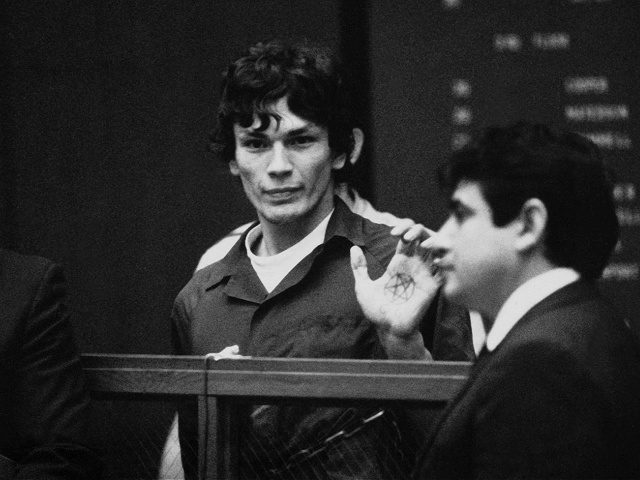Among many other things she got wrong, Michelle McNamara, the late scribe of I’ll Be Gone In the Dark, claimed that once a serial killer is captured and brought before the public, he never lives up to our expectations. Instead of a monster or the Devil himself, we are presented with someone who is just, well, a guy.
While this is true sometimes, admittedly more often than not, Richard Ramirez would like a word.
Over one very hot summer in 1985, Ramirez terrorized Southern California in ways never before seen. He was a serial killer who also raped and kidnapped (children), who let some victims live, who killed using different methods, who moved around geographically. Were it not for a tennis shoe imprint, the crimes might never have been connected.
In his four-part Netflix documentary Night Stalker: The Hunt for a Serial Killer, which premiered this week, director Tiller Russell does his best to recreate the terror and horror of that terrible summer without getting too lurid.
Instead, he turns the 3.5 hours (give or take) into something like a procedural by interviewing the two (now retired) homicide detectives most responsible for cracking the case: Gil Carrillo and Frank Salerno of the Los Angeles County Sheriff’s Department. He also interviews other members of law enforcement as well as some of the victims and relatives of the victims who found their loved ones after a Ramirez rampage.
For the first three episodes, like everyone else at the time of the killings, we’re not introduced to Ramirez. Instead, he’s a faceless Boogeyman snatching and assaulting children, murdering, torturing, raping, a home invader who’s seemingly impossible to catch. Like Manson (another monster whose monstrousness did not fade after being captured), Ramirez left behind pentagrams, including in a car he fled after almost getting caught.
It isn’t until the fourth episode that we’re introduced to Ramirez, and even then, we’re not told much. The rundown of his biography only takes a few minutes. This is probably because there is already a cult around Ramirez (who died of natural causes on Death Row in 2013), and Russell seems concerned about contributing to that.
No matter, the documentary is so well done, you don’t feel what’s missing. Carillo and Salerno were legendary detectives (Salerno also cracked the Hillside Strangler murders in the 70s) and both have aged in that same way John Wayne and Charles Bronson did — into men who appear stronger and more formidable than ever before.
Both tell their stories, the detailed tick-tock of those terrible months in a fairly straightforward way. Salerno, the senior of the two (who took Carillo under his wing) isn’t interested in sharing anything about his personal life, while Carillo (and his wife) discuss the toll and fear of what it takes to dedicate yourself to a horror show, like the one Ramirez put on.
The best compliment I can give Night Stalker is that while I didn’t learn anything new (my true crime fascination reaches back more than 25 years), I still found it compelling. I do, though, believe it would have been even more compelling with more of a focus on Ramirez, his mindset, what he was thinking, his wretched childhood. Like most monsters, he’s a fascinating character. But I still respect Russell’s decision.
Also worthy of respect is how Russell doesn’t veer off into Woketardery. I can’t tell you how many present-day documentaries end up crashing and burning because the director feels the need to hit the woke sweet spot, lecture the viewer, and virtue signal. This childish impulse ruins everything, and even though we’re talking about policing in Los Angeles in the 80s, it thankfully doesn’t happen here.
I was also curious if Russell would have the moral courage to tell the truth about then-San Francisco Mayor Dianne Feinstein, who’s big mouth almost blew up the case. To his credit, he did. He also doesn’t hide the disgust both detectives felt towards local media but gives the media a chance to explain their side.
So for me, Night Stalker was essentially a repackaging of everything I already knew, but to hear it straight from these detectives, the victims, and their relatives… I was riveted. For those unfamiliar with the Ramirez story and wary of what I call exploitive true crime (which I avoid) that revels in the blood and violence, you will enjoy Night Stalker. It’s not so much the story of Richard Ramirez. It’s the story of how he was stopped.
I would also recommend Tiller Russell’s excellent 2014 documentary The Seven Five.
Follow John Nolte on Twitter @NolteNC. Follow his Facebook Page here.

COMMENTS
Please let us know if you're having issues with commenting.